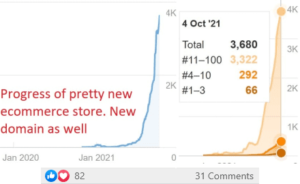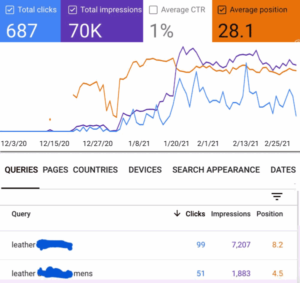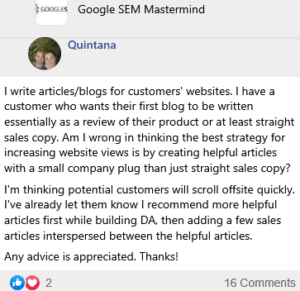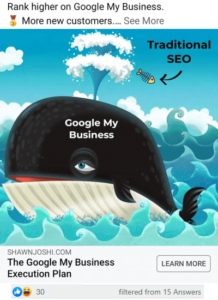Discussion 2: SEO Difference Between eCommerce and regular Websites
Keron
Hi guys. Is Ecommerce SEO any different from traditional SEO | Search Engine Optimization? If so how?
18 👍🏽 18
[filtered from 18 Answers]
Yes, it is different. You can not put great content on the product pages as those pages have to target your customers via a sales copy.
but how is that different from traditional SEO if you understand SEO as optimizing your pages for the search intent? Then any shall only get the kind of content visitors (and Google) will expect there to be.
Guzman » Marcus
For the product pages one ranks mostly for the brand terms unless you are Amazon.
I would create blog posts and drive traffic to my product pages.
The overall SEO remains the same but the approach/process changes.
Marcus
I still don't see a difference to any other ethical SEO 😉 While there are special "features" you can use for e-commerce like Schema.org product markup for PDPs or product lists markup for PLPs, special speed optimization issues / possibilities like lazy loading for images on PLPs.
Certain challenges like near duplicate content if you have different PDPs for product variants … So I do admit, you have technical difference regarding SEO between different website types like e-commerce versus blog.
But the underlying strategical SEO idea that you shall optimize your pages for the user – not for what might work well if you intend to game the search engine, is not different between any kind of website.
Schema.org – Schema.org
SCHEMA.ORG
Schema.org – Schema.org
Schema.org – Schema.org
Guzman » Marcus
I'm not disagreeing to what you are stating but the processes that are followed for a normal blog and the strategy is different to what needs to be done in case of an eCommerce website. Or maybe it's just me.
I'm doing great in driving traffic to my websites but when it comes to DropShipping websites, I've had little success from SEO than what I extract from paid ads.
Taylor
No – it's not really different. Same tools, same goals, just a bit different in what you focus on. Similar to how local SEO and SEO for affiliate sites are different.
It's a bit more technical SEO – crawl budget for big sites, schema, speed, etc.
On-page is similar – pay attention to the buyer journey and what each page is supposed to accomplish (search intent).
Conversion rate optimization (CRO) (in my experience) is a bigger beast.
Your marketing analytics can be a larger part of your time, depending on the amount of products. key performance indicators (KPIs) should be defined for higher and lower funnel levels.
I like this. Personally I consider CRO and SEO to be seperate issues. You could run ads to an ecom site and due zero SEO, but improving conversion rates is still and issue.
Bogdan
yes, of course. basically, an ecomm site, especially one with lots of products, is a duplicate-content "farm". Not only you have lots and lots of pages with almost the same thing (different only by colors, size, maker etc), but there are probably dozen other websites having the almost exact same pages. So, you need to make things different all over. Another thing – the website size, optimizing for crawl budget is more important than ever.
Khero
The problem with ecom SEO is that other blogs won't be motivated to link to your product pages. People want link to content that provide value such as articles etc. So i guess it harder to do link building for ecom site. There are probably techniques around this such as creating a business blog. Some niches are just harder to build links for such as ecom, gambling, adult dating etc. So you just need to understand the ressources required for SEO in your niche and see if you can go for it.
Daniel
it sounds to me like you may know more than "some" of those who are replying already or more than you think you know and I said maybe I'm not making judgments on anyone here. Schema markup is indeed one of the big things but it's that you're trying to make it a different variation of Search Engine Optimization (SEO) that's a little confusing to people I think.
Now I will also say that I wouldn't say you can't put great content on an e-commerce product page you have your long description to work with you can put h2 and h3s in there along with a thousand words if you want. You can use keyword variations in semantics and trigger Natural Language Processing (NLP). So it's not that different than trying to rank a page. However there are many distinctions, for instance, your products are never going to rank in the local pack of course for that is only for local root domains. Your product page is unlikely to rank organically also. Google surfaces are where your e-commerce is more likely to appear, and that just has more to do with your root domain's authority than anything else.
This is also why e-commerce websites rely so heavily on Pay-Per-Click (PPC) and the Google products merchant center feed. So I think you may know more about what you're doing than you think.
And there was another point someone made wherein a good idea is indeed to write a blog post or numerous blog posts even going as far as creating a satellite system and then pointing it to your product page with an internal link.
So let's say your product is red shoes. You would then go create a blog post about red shoes. But then you will create an orbit of satellite posts if you will that have all to do with the many different semantic versions of the red shoe keyword. So perhaps you can have a blog post pointing at your main keyword blog post red shoes and that blog post can be called how to tie red shoes, and in this, you can also then, therefore, get a shot at appearing in the Frequently Asked Questions (FAQ) section you can also design it to pop in the Power Purchase Agreement (PPA) section. Just to continue with the example you can have another blog post called how are red shoes made pointing at your red shoe Master post. Then create another one called what's the best way to clean red shoes pointing at your master blog post page which is pointing at your product page. Then work on getting your backlinks connected to those blog post pages not your product page though a minimal amount of backlinks can hit your product page it is far more natural that your backlinks hit your blog posts and remember the number one SEO guide should be the question what is natural?
So you can go even further with this by then creating moons for those planets that orbit the Sun that is your red shoe Master keyword post page if you will. And all of those moons can be even deeper semantically orientated relevant posts that point at the orbiting post that then points to your Master post which then points at your product. So you wind up with something that looks exactly like our solar system. And so that solar system along with the backlinks you connect is what will drive the authority to your product page giving it great power and also increasing the number of potential gateways that will appear in the Search Engine Result Pages (SERPs) that would lead your user to the product page.
This is a very good and powerful system.
wonderful
Glenn
Im into ecomm SEO. Aside from basic onpage optimization, I usually add FAQ section to gather common questions and topics discussed. Reviews are a must to. So get them as much as you can. Conversion is another consideration though. My main go to strategy is writing articles pertaining to the product that serves as a silo. Then also put a little pop up javascript banner at the bottom of the page to add clicks.
These may satisfy you:
» Advice for Finding and Hiring an Ace SEO Expert in Ecommerce
» Make a Blog Section to Strengthen the eCommerce
Discussion 1: Duplicate Content | Similar Products in Some Posts | E-Commerce
Tom
Question about duplicate content…
Here's the scenario:
I own a website selling dumbbells for weight lifting.
The dumbbells we sell are our own brand and the content we have created is unique to our brand (it's not copied and pasted from a manufacturer website).
We have 3 different weights available; 10kg, 20kg, and 30kg.
Each weight variant has its own product page.
"buy 10kg dumbbells"
"buy 20kg dumbbells"
"buy 30kg dumbbells"
Does each of our product pages need unique content from each other?
The only difference between the products is the weight (either 10kg, 20kg, or 30kg).
Thanks in advance
3 👍🏽 3
[17 💬🗨]
Hi Tom
. Yes, you really need unique content if they are unique products. What helps with creating it is to think why someone buys a 30 kilo dumbell rather than a 10 kilo set, and why they'd be upset if you sent them a 20 kio set. There are different needs in the customer's mind. Some weights are more about just keeping fit, others are more about serious muscle-building. So get into that on the page, what the use-case differences are, and not only will that give you content that isn't duplicate, you'll find it massively increases long-tail traffic, AND raises conversions too.
Thanks Ammon, is there a certain percentage of duplicate content that would be acceptable within the main body?
I have created unique short descriptions which will be visible at the top of the product page. I feel these short product descriptions tackle the customer needs but at the moment, a lot of the main body text is the same.
I've seen several articles online today about "Duplicate content myths" etc but struggling to get my head around it all.
In my case, the duplicate content is not about content copied from other websites so I was wondering whether having similar content on my site would negatively affect my rankings for each of those product pages.
Dolby » Tom
there are lots of myths going around, it's more of a display issue in the Search Engine Result Pages (SERPs). If all three pages are similar but not completely different and someone searches for 10kg the relevant one should be in the SERPs. If someone searches for simply dumbbells all three pages will be included in the SERPs however the primary page that Google thinks will match the users query will appear first, with the other two possibly coming under the 'repeat the search with similar results included' tab at the end of the results. Ensure that everything is indexed using search console and you'll be okay – a penalty is a myth (unless your site is an entire duplicate of another site probably).
Ammon Johns 🎓 » Tom
if you are worried about a 'duplicate content penalty' of any kind, don't be. There is not, and never has been, any such penalty, nor any need for one. The only real cost of duplicate content is that you are splitting up the link-attracting power of the content over multiple URLs, so each is not getting the full share the content could, and, of course, where you could have three pages each pulling unique visits through different ways of wording stuff, you only get the search engine matching one set of content.
Duplicate content already costs you, there has never been a need for any search engine to add to that.
But that said, long-tail traffic is huge, and you only get that by really utilizing those pages to be unique, with their own phrasings and precise way of explaining aspects of the product, or its particular applications and uses. More diverse content creates more diverse matching to searches.
Tom ✍️
Thank you both Rob
and Ammon
. That's really helpful. It makes much more sense now too. If the content is the same across all three pages then it's going to rank for fewer longtail keywords and so I'll see less info in Google Search Console (GSC).
Dolby
Agree with Ammon – there will be a big audience difference between each a 10kg user and 30kg. You'll have to target the dumbbell weight and plate weight individually (if you're selling the bells and weights separately) – I'm having massive problems buying any reasonably priced dumbbells right now and the amount of mis-labelled products makes sifting through product pages a chore. Hugely competitive industry right now – good luck!
spot on about the boom in home fitness equipment since the pandemic. Not only are a lot of people resisting going to a gym even if they had a membership, but a lot of people who've never had or wanted a gym membership are finding those pandemic pounds slipping on, and wanting to trim up a bit.
And Tom
, this is exactly why Rob and I are both saying how important that extra content can be. Lots of customers out there that are not familiar with dumbbells, or what sizes and weights are best, but they are searching based on what they do know "dumbbells for weight loss" and "dumbbells for casual keep fit" are most likely the kind of terms they'd used if challenged for exactly what kind of dumbbells they are looking for.
So, adding content about what each weight of dumbbell is typically used for, what if any maintenance is needed, whether or not that can be stored in a closet, are all things that can match some of the very weird long tail searches going on out there.
Rizwan
Even if you make unique content for each page, what about the url?
If you make difference in urls with only their kg like 10 kg, 20 kg, 30 kg
Will all urls be indexed?
if links to the URLs exist, Google finds them. That's what spiders are built to do.
Rizwan » Ammon Johns
but if urls look like same with minor difference, will it not get any trouble?
For example below 2 urls are look like same
https//example.com/dumbbells-10kg/
https://example.com/dumbbells-20kg/Ammon Johns 🎓 » Rizwan
have you ever looked at the URLs Youtube uses for it's content? And Google own Youtube.
Rizwan » Ammon Johns
I think, not every Youtube url is indexed in Google
🤭1
Ammon Johns 🎓 » Rizwan
Google own Youtube. All of it. They *are* Youtube and Youtube is also them.
Tom ✍️ » Rizwan
Yes all the URLs are indexed and ranked individually.
Dolby
One trick you might be missing out on is going down the GMB local business advertising route. Ordering 30kg of anything right now is going to add significant costs with the shipping, so a lot of people are scouring Facebook Marketplace, Craigslist, eBay and local businesses that are still open.
this is a good idea! You're right, there are lots of people selling on Facebook Marketplace and other local sources at the moment. Shipping costs are a lot!
Hofman
Check if similar product pages get indexed in other industries (e.g. Iphone models) – they do
These may satisfy you:
» What SEO Parts do They Include Duplicate Content?
» Thoughts on Keyword Cannibalization in Search Engine Optimization (SEO)
» Some Pages Are Ranking for the Same Keyword | Internal Linking Others to the Most Satisfying Page | Keyword Cannibalization





